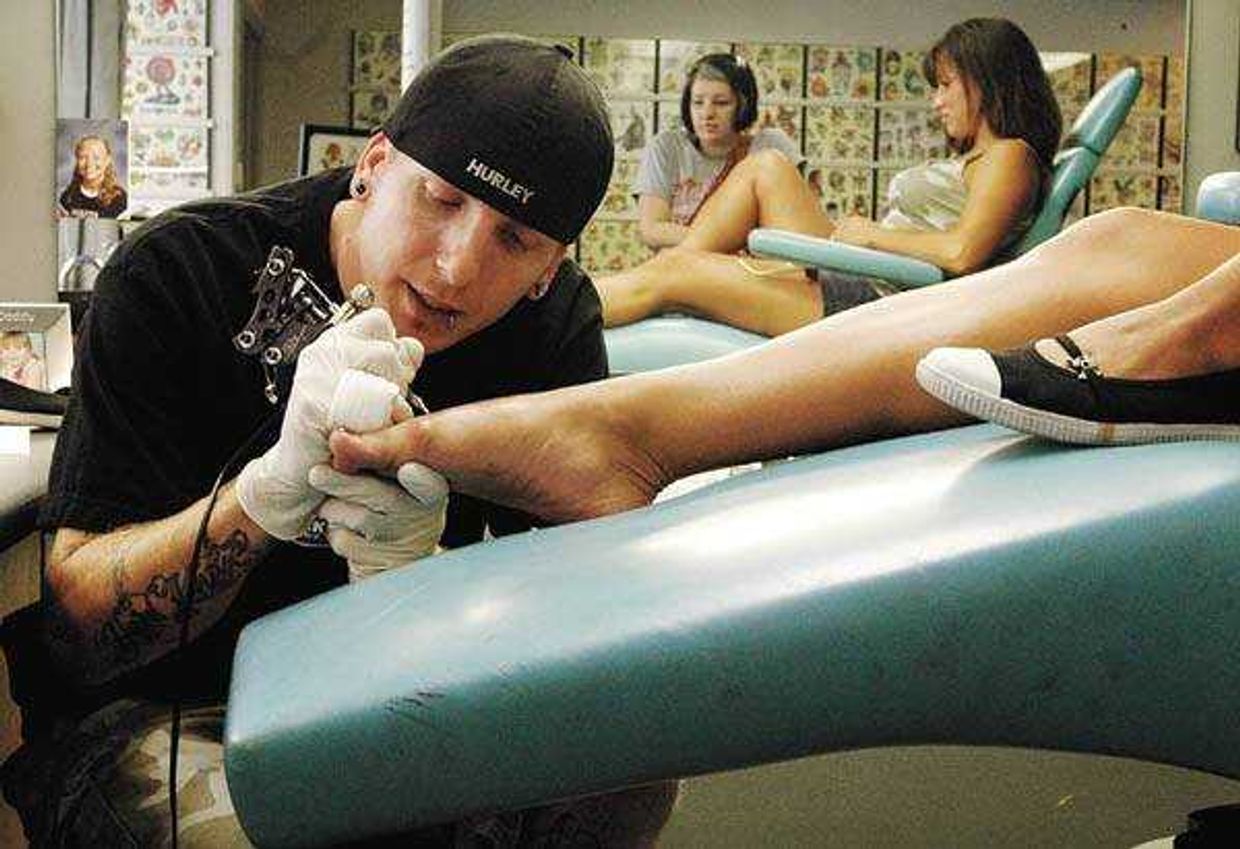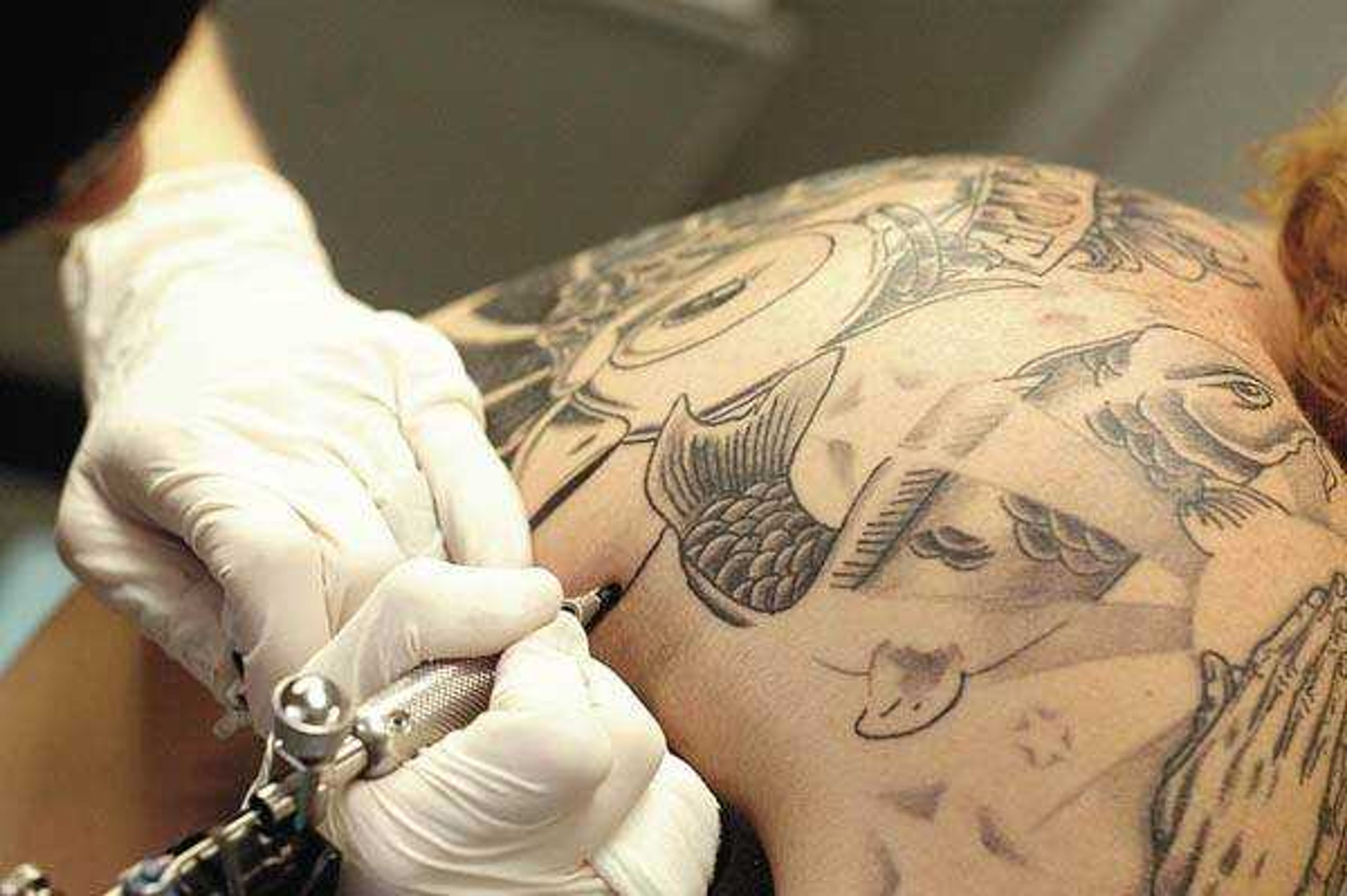Tattoo who?
Stats: about one in four Americans between 18 and 50 have at least one tattoo, according to a survey released in the Journal of the American Academy of Dermatology in June. About half of 18-to-29-year-olds have either a tattoo or piercing that is not in the soft lobe of the ear, according to the study...
~Cape's tattoo culture is about a lot more than bikers and rockers. Now doctors, lawyers and the mayor are in on the fun.
Jake French has a secret: If he could go back to being tattoo-free, he would in a heartbeat. It's not exactly what you'd expect from a professional tattoo artist who has visible tats on his forearms.
French is an artist at A Different Drummer Tattoo Studio in Cape Girardeau, an inviting locale that plays alternative rock from a Sirius satellite radio. Before he starts penning ink on someone's skin, he's sure the person getting inked understands what they're getting into.
French recently sat down with a 17-year-old guy and his mother to make sure the minor wasn't being stupid.
"For him, it's going to be so hard, because he's not working, to find work," French says. "Either he's going to wear long sleeves or he's going to be working at McDonald's the rest of his life."
French's isn't what you'd expect when you think piercings and tattoos. Tattoos are supposed to be given by freaky, dirty middle-aged men who look like Dennis Hopper in "Easy Rider."
Times have changed. And when you start looking closely at Cape Girardeau's piercings and tattoos culture, you'll find that most of those old stereotypes about who sticks those needles in your body and who chooses to get body modifications are radically different from 20 years ago.
"Back then, it was the bikers and war veterans … or the hardcore rock groups that were screaming on stage," says Erin Kirsch, a 22-year-old with three tattoos.
The only shop that even hints at the stereotype is Tatmandu Tattoo, where the employees listen to death metal and are allowed to grow their hair long. But after glancing at the thank you note Cape Mayor Jay Knudtson sent them (it's framed on the wall), you know that even this place breaks down those preconceived notions.
Andy Estes, a 25-year-old tattoo artist and piercer at Tatmandu, says the business has changed every year.
"The industry is still cleaning up its image from the bikers, sailors, freak shows, prostitutes and actually tattooing businessmen and the Mayor," Estes says. "It's still evolving."
Each studio carries its own vibe. Each one has people of all ages come in, but each one also seems to cater specifically to a different core audience.
A Different Drummer pulls in the late-high school and college crowds and Tatmandu takes post-college age and beyond. The third Cape tattoo studio, Fleshhound, falls somewhere between the other two because its audience is wildly varied.
"I've tattooed several doctors, nurses, soccer moms, preachers, people from all walks of life," says Renee Gordon, owner of Fleshhound. "And just a couple months ago, I gave a man in his mid-seventies his first tattoo. You never know."
These studios have ushered in a new era of tattooing and piercing, one that started in the early 1990s. This is a new generation learning to express themselves in different ways from their predecessors.
"It's just a way to express how you are," Kirsh says. "It sets people aside from ordinary people."
Although, tattoo receivers will tell you, it is a painful way to express one's self. Tyson Whiteside, who was getting his back inked with a set of Japanese isobars while being interviewed, has four mid-size tattoos. He says it never gets easier to tolerate the pain.
"You always forget what it feels like, but when you get it done again you remember how much it hurts," the 18-year-old said.
Thanks to the latest boom, now about one in four Americans between 18 and 50 have at least one tattoo, according to a survey released in the Journal of the American Academy of Dermatology in June.
And with younger people, the trend is even more prevalent. Just about half of 18-to-29-year-olds have either a tattoo or piercing that is not in the soft lobe of the ear, according to the study.
So what happened to make it OK to get a tat or nose piercing? The emergence of reality television shows based around tattooing like "Miami Ink" on The Learning Channel and "Inked" on the A & E Network likely helped.

Kirsch says help also came from an unlikely source -- females.
"I think a lot of the girls have helped ease up on the whole punk rock, scary people stereotypes," Kirsch says.
It's true - girls are the real saviors of the tattoo industry, at least locally. Kirsch is one of the many girls that chose to decorate her body.
"It's just a way for people our age for them to keep something on them for a period of their life," Kirsch says. "It's more common, more accepted than what it was."
Chris Rose, the owner of A Different Drummer, says his business is 75 percent female and he expects that trend to continue.
"I know a lot of my guy friends don't have tattoos, but I can't name hardly any females I know that don't have one," Rose says.
Gordon, the only female studio owner, is one woman who is doing her part for the somewhat-feminist tattoo movement. She says that most people from Cape Girardeau and surrounding areas still don't accept women with forearm tattoos, so she is having family portraits inked onto her entire left arm.
"I wanted to show people not only that a woman can have tattoos, she can have an entire set of beautiful tattoos," Gordon says. "If the subject is tasteful, it can enhance a woman's beauty."
Kirsch says there are still a lot of older people who don't approve of getting tattoos.
"I'm the only one in my family who has tattoos," she says. "My family gives me trouble about them, but I don't care. I like them."
But Kirsch also notes that some of those people slowly come around after they adjust to the idea.
"My dad said 'Don't you dare get one while you're living under my roof,'" Kirsch said. "He didn't like the first one I got. But, he ended up liking the next two, saying 'Ah, that is pretty, I like that.'"
Sometimes that family disapproval can be well placed and not just a product of a generational phobia. French says his parents warned him he'd regret his earliest tattoos and 10 years after he got his first one, he wants that clean slate.
There is an option for those like French who want to get rid of their body decor: Laser tattoo removal. Only one location within a 90-mile drive of Cape can remove or fade tattoos. The ENT consultants on the fourth floor of St. Francis Wellness Center are those people.
On an average tattoo removal, someone can pay as little as $300 for a single colored tattoo or up to $1,200 for a multi-colored tattoo. The procedure is usually not covered by insurance because it is considered "cosmetic surgery," according to Dr. Christopher Jung, who has been doing the procedure for 12 years. He says its popularity will only continue to grow.
The most recent generation getting ink "look at it as an extension of jewelry, a fashion accessory," Jung said. "But what looks good in your twenties may not look so attractive when you're in your forties."
And the procedure, just like getting a tattoo, isn't a cakewalk. The promotional brochure for tattoo removal provided by Jung notes that the amount of pain experienced during removal is "similar to the snap of a thin rubberband or specks of hot bacon grease on the skin."
For piercings, though, there is no need for costly removal procedures. Meghann Humphries, a piercer at A Different Drummer, used to have several facial piercings, but has since taken them all out.
"If you want to look outrageous for a little while you can and then when you want to look business-like and professional you can do that also and there's no side effects," Humphries said. "It's cool because you can take it out and nobody ever knows."
Connect with the Southeast Missourian Newsroom:
For corrections to this story or other insights for the editor, click here. To submit a letter to the editor, click here. To learn about the Southeast Missourian’s AI Policy, click here.










